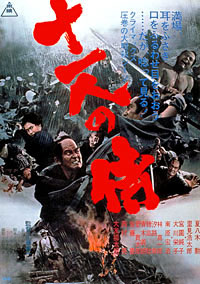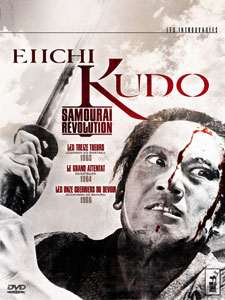 Eichi Kudo (1929-2000), descended from samurai, made a handful of classic samurai films that had subtitled prints in the US, Canada, & Hawaii in the 1950s & 1960s, seen almost exclusively in ethnic movie houses, & rerun periodically until those cinemas began dying off late in the 1970s.
Eichi Kudo (1929-2000), descended from samurai, made a handful of classic samurai films that had subtitled prints in the US, Canada, & Hawaii in the 1950s & 1960s, seen almost exclusively in ethnic movie houses, & rerun periodically until those cinemas began dying off late in the 1970s.
These were never well known on the film festival circuit nor to non-ethnic cinema houses, otherwise Kudo's name might've become well known in the west. Even today his films are available subtitled only thanks to the grey market, copies either recorded off the air in Hawaii or as "fan-subbed" decent quality pirate dvd editions.
But the bogger reason Kudo's reputation remained limited was the studio system which did not support very many directors to pursue their own film projects, & Toei Studios more rigidly than most preferred to assign commercial projects.
So Eiichi Kudo's name appears on a large number of charming, upbeat, trivial films, sometimes with big stars who controlled their own images, such as singer Misora Hibari, piffle like Flowers on the Road (Hanakago dochu, 1961); or films for youth-stars, such as Mansion of Vendetta (Chimoji yashiki, 1962) or Death Duel (Ninkyo kisogarasu, 1965), both starring Hashizo Okawa & Kudo's favorite mature actor, Ryotaro Otomo; plus yakuza-eiga during the waning years of Japanese gangster films.
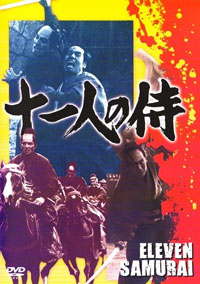 By the time he made the absurdist ninja fantasy Hanzo Hattori: Shadow Warriors (Kage no gundan Hattori Hanzo, 1979) he was hardly more than an emblem of a serious decline throughout the industry, the '70s having become a near wasteland compared to the classic jidai-geki of the '50s & '60s. Ultimately Kudo ended up in television work. By the time he made the absurdist ninja fantasy Hanzo Hattori: Shadow Warriors (Kage no gundan Hattori Hanzo, 1979) he was hardly more than an emblem of a serious decline throughout the industry, the '70s having become a near wasteland compared to the classic jidai-geki of the '50s & '60s. Ultimately Kudo ended up in television work.
So his was to be a long-lasting & successful career, but all too rarely with anything approaching freedom to achieve art.
There was a brief window when zongoku-jidai-geki, or "cruel history tales," were fashionable, when Kudo was allowed to make his best films, which number a scant three: The Thirteen Assassins (Juusan-nin no shikaku, 1963), The Great Killing (Dai satsujin (1964), & Eleven Samurai (Ju-ichinin no samurai, 1966), constituting his "revenge trilogy" also called the "samurai revolution trilogy."
One of the romantic things about films of medieval Japan is how historically the nation was knit together with footpaths & in so much of the cinema, heroes walk from place to place, through stunningly beautiful landscapes. This also sets samurai films apart from westerns, which are almost always populated with more horses than people.
However, Kudo's great-grandfather went to Hokkaido after the dissolution of the samurai class & became a horse rancher. Horses remained a family business, & even in his films Kudo was not apt to pass on a chance to place horses into a story.
For example, in The Great Killing, rebels quickly obtain a small herd of horses & stampede them into a parade of shogunate guards. And right from the opening scenes of Eleven Samurai, we see samurai on horseback.
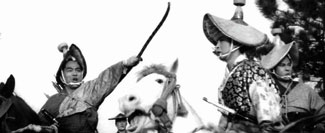 As the tale opens, young Lord Nariatsu (Kantaro Suga) on a deer hunt crosses a border into Oishi, a rival lord's domain.
As the tale opens, young Lord Nariatsu (Kantaro Suga) on a deer hunt crosses a border into Oishi, a rival lord's domain.
Lord Abe witnesses Nariatsu kill a peasant for no reason, & chastises him harshly, demanding he leave at once for his own fief. So Nariatsu puts an arrow in the eye of Lord Abe of Oshi, kiling him.
This rash lord is something of a known maniac, but he is also the son of a former shogun, & brother of the present shogun. So the matter of his criminal behavior is easily covered up, with further victimization of vassals of Oishi. A story paralleling that of the brave forty-seven ronin develops, as vassals of the slain lord plot vengeance against the wicked brother of the shogun.
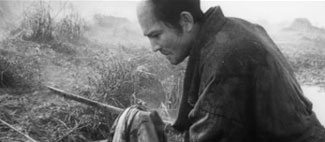 Hayato (Isao Natsuyagi) leaves the clan to be a ronin, but really so that he can pursue the assassination of Nariatsu, getting the jump on the publication of a legal cover-up that will result in his clan being abolished. Hayato (Isao Natsuyagi) leaves the clan to be a ronin, but really so that he can pursue the assassination of Nariatsu, getting the jump on the publication of a legal cover-up that will result in his clan being abolished.
Under the secret instructions of Chamberlain Tatewaki (Koji Nambara), Hayato selects & tests men to support his intention, men who will die eagerly to achieve this aim.
Lady Nui (Eiko Okawa) with sword begs to join the plot against Nariatsu. As swordswomen go, she is weakly cast & doesn't quite live up to the promise of her introduction to the story. But as stories go, it's nice that of the Brave Eleven of Oishi is a woman.
They also encounter a truly strong ronin Daijuro (Ko Nishimura), scruffy but invincible, who exclaims regarding Nariatsu, "I always dreamed of killing that moron!" & begs to join their cause.
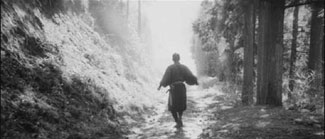 The brother of Hayato's wife, Orie (Junko Miyazono), believes his brother-in-law has lost all sense of duty, & tries on his own to kill Nariatsu, only to be tortured & killed grotesquely. The brother of Hayato's wife, Orie (Junko Miyazono), believes his brother-in-law has lost all sense of duty, & tries on his own to kill Nariatsu, only to be tortured & killed grotesquely.
Hayato had had a prefect marriage of mutual love, but has had to give up everything for duty. And then Orie, after initial misunderstanding, commits jigai (women's equivalent of seppuku, stabbing of her own throat), so as not to be a hindrance to her husband's duty.
Daijuro is instrumental in the manufacture of bamboo canons intended for use in an ambush on a forest path. Trees rigged to fall onto the trail, & the canons, thorow Nariatsu's guard into chaos. The avengers attack with great success, but it was only the dream of Chamberlain Tatewaki, kind of a stortelling cheat really.
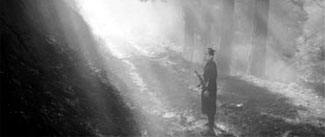 I hate it when stories go directions that turn out to be a dream. But the purpose is to have it both ways in the film: we see how it should've worked, but in the story proper this plan of attack is derailed. I hate it when stories go directions that turn out to be a dream. But the purpose is to have it both ways in the film: we see how it should've worked, but in the story proper this plan of attack is derailed.
The plotting avengers are griefstricken of the lost opportunity, thanks to Tatewaki having been deceived by Minister Mizuno (Kei Sato) who had pretended to support Tatewaki's cause but is really part of the cover-up.
The very next dai the Oshi fief is disbanded & the land given over to Nariatsu. When the brave avengers learn their chamberlain had been tricked into stopping the well-planned attack, they find they must act swiftly, without a good plan, relying exclusively on nerve & dutifulness.
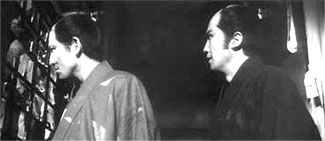 In a deluge, they come upon the little station-town where Nariatsu insisted on waiting out the rain, though his chief vassal Chamberlain Gyobu (Ryutaro Otomo) counsels otherwise. In a deluge, they come upon the little station-town where Nariatsu insisted on waiting out the rain, though his chief vassal Chamberlain Gyobu (Ryutaro Otomo) counsels otherwise.
When the avengers show themselves, mayhem erupts in the deluge, imagery obviously influenced (like the film's title) by Akira Kurosawa's hard-rain battle scenes in Seven Samurai (Shichinin no samurai, 1954).
The final reel of the film is just about non-stop varied action. Two of the avengers carry Daijuro's canon powder & turn themselves into human bombs. Another is expert with darts.
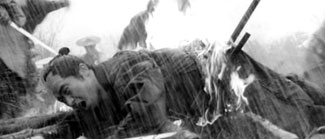 Gyobu's men are too nkumerous & the brave eleven are being picked off one by one. Hayato & Gyobu have their one-on-one duel, two powerful men as worthy opponents. Gyobu's men are too nkumerous & the brave eleven are being picked off one by one. Hayato & Gyobu have their one-on-one duel, two powerful men as worthy opponents.
Nui has her brave moment. Another of the eleven loses his sword & kills one more enemy with a stick before dying.
Finally only Hayato remains to carry on the battle, striving for the well-defended & cowardly lord. It's a gory & real-seeming clash of many swords in the mist.
It's ghastly & gorgeous at the same time, the final moments of the endless carnage absolutely incredible. A superb film of its type, it'll be hard to catch your breath!
copyright © by Paghat the Ratgirl
|
